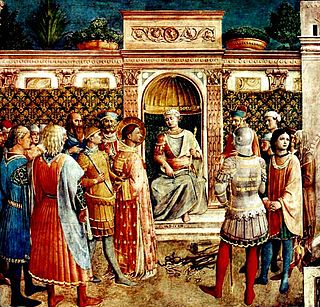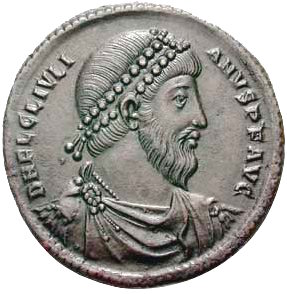Ancient Roman philosophy was heavily influenced by the ancient Greeks and the schools of Hellenistic philosophy; however, unique developments in philosophical schools of thought occurred during the Roman period as well. Interest in philosophy was first excited at Rome in 155 BCE. by an Athenian embassy consisting of the Academic Skeptic Carneades, the Stoic Diogenes, and the Peripatetic Critolaus. [1]
During this time Athens declined as an intellectual center of thought while new sites such as Alexandria and Rome hosted a variety of philosophical discussion. [2]
Both leading schools of law of the Roman period, the Sabinian and the Proculean Schools, drew their ethical views from readings on the Stoics and Epicureans respectively, [3] allowing for the competition between thought to manifest in a new field in Rome's jurisprudence. Meanwhile, it was during the Roman period that Plato and Aristotle's academies concluded their practices. Although, it was also during this period that a common tradition of the western philosophical literature was born in commenting on the works of Aristotle. [2]
Characteristics
Roman philosophy includes not only philosophy written in Latin, but also philosophy written in Greek by Roman citizens. Important early Latin-language writers include Lucretius, Cicero, and Seneca the younger. Greek, however, was the more popular language for writing about philosophy, so much so that the Roman Emperor Marcus Aurelius chose to write his Meditations in Greek. Later, with the spread of Christianity inside the Roman Empire, came the Christian philosophy of Saint Augustine of Hippo. One of the last philosophical writers of antiquity was Boethius, whose writings are the chief source of information as to Greek philosophy during the first centuries of the Middle Ages. [4]
While philosophers are usually categorized according to school, some philosophers of the Roman period held eclectic beliefs, taking teachings from more than one school. The Sabinian and Proculean schools of law, the two largest schools of legal thought in the Roman period, derived their understanding of ethics heavily from Stoicism and Epicureanism respectively, again providing a current for philosophical thought to influence life in the Roman period.
History
While philosophy was often admired by jurists and aristocrats, of the emperors the affinity that Hadrian held for philosophy stands out, a feature that was likely amplified by his philhellenism. Hadrian was recorded to have attended lectures by Epictetus and Favorinus on his tours of Greece, and invested heavily in attempting to revive Athens as a cultural center in the ancient world through methods of central planning on his part. [5] Hadrian held philosophy in high regard, something unusual for Roman emperors, who were often indifferent, if not oppositional to it as a practice. These sentiments however, were also shared by Nero and Julian the Apostate, and Aurelius himself, as he is considered today to be a philosopher.
During the autocratic rule of the Flavian Dynasty, A group of philosophers vocally and politically protested against the actions of the emperor, particularly under Domitian and Vespasian. This resulted in Vespasian reacting via banishing all philosophers from Rome, save for Musonious Rufus, although he was later also banished from Rome. [6] This event later became known as the Stoic Opposition, as a majority of the protesting philosophers were of the Stoic school of thought. Stoics regarded the opposition under the emperors highly later in the Roman period, however the term of Stoic Opposition was not coined until the 19th century due to the writings of Gaston Boissier. [7]

Marcus Aurelius was a Roman emperor from 161 to 180 and a Stoic philosopher. He was the last of the rulers known as the Five Good Emperors, and the last emperor of the Pax Romana, an age of relative peace and stability for the Roman Empire. He served as Roman consul in 140, 145, and 161.

The 2nd century is the period from 101 to 200 in accordance with the Julian calendar. It is considered part of the Classical era, epoch, or historical period.
Favorinus of Arelate was an intersex Roman sophist and Academic Skeptic philosopher who flourished during the reign of Hadrian and the Second Sophistic.

Classical Latin is the form of Latin language recognized as a standard by writers of the late Roman Republic and Roman Empire. In some later periods, it was regarded as good or proper Latin, with following versions viewed as debased, degenerate, vulgar, or corrupted. The word Latin is now understood by default to mean "Classical Latin"; for example, modern Latin textbooks almost exclusively teach Classical Latin.
Gaius Musonius Rufus was a Roman Stoic philosopher of the 1st century AD. He taught philosophy in Rome during the reign of Nero and so was sent into exile in 65 AD, returning to Rome only under Galba. He was allowed to stay in Rome when Vespasian banished all other philosophers from the city in 71 AD although he was eventually banished anyway, returning only after Vespasian's death. A collection of extracts from his lectures still survives. He is also remembered for being the teacher of Epictetus.
The Second Sophistic is a literary-historical term referring to the Greek writers who flourished from the reign of Nero until c. 230 AD and who were catalogued and celebrated by Philostratus in his Lives of the Sophists. However, some recent research has indicated that this Second Sophistic, which was previously thought to have very suddenly and abruptly appeared in the late 1st century, actually had its roots in the early 1st century. It was followed in the 5th century by the philosophy of Byzantine rhetoric, sometimes referred to as the "Third Sophistic."

The gens Aurelia was a plebeian family at Rome, which flourished from the third century BC to the latest period of the Empire. The first of the Aurelian gens to obtain the consulship was Gaius Aurelius Cotta in 252 BC. From then to the end of the Republic, the Aurelii supplied many distinguished statesmen, before entering a period of relative obscurity under the early emperors. In the latter part of the first century, a family of the Aurelii rose to prominence, obtaining patrician status, and eventually the throne itself. A series of emperors belonged to this family, through birth or adoption, including Marcus Aurelius and the members of the Severan dynasty.
Successions of Philosophers or Philosophers' Successions was the name of several lost works from the Hellenistic era. Their purpose was to depict the philosophers of different schools in terms of a line of succession of which they were a part. From the 3rd to the 1st centuries BC there were Successions written by Antigonus of Carystus, Sotion, Heraclides Lembos, Sosicrates, Alexander Polyhistor, Jason of Nysa, Antisthenes of Rhodes, and Nicias of Nicaea. The surviving Lives and Opinions of Eminent Philosophers by Diogenes Laërtius draws upon this tradition.
Hellenistic philosophy is the period of Western philosophy and Middle Eastern philosophy that was developed in the Hellenistic period following Aristotle and ending with the beginning of Neoplatonism.
This page is a list of topics in ancient philosophy.
The gens Aelia, occasionally written Ailia, was a plebeian family in Rome, which flourished from the fifth century BC until at least the third century AD, a period of nearly eight hundred years. The archaic spelling Ailia is found on coins, but must not be confused with Allia, which is a distinct gens. The first member of the family to obtain the consulship was Publius Aelius Paetus in 337 BC.

Quintus Junius Rusticus, was a Roman teacher and politician. He was probably a grandson of Arulenus Rusticus, a prominent member of the Stoic Opposition. He was a Stoic philosopher and was one of the teachers of the emperor Marcus Aurelius, whom Aurelius treated with the utmost respect and honor.
Quintus Sextius the Elder was a Roman philosopher, whose philosophy combined Pythagoreanism with Stoicism. His praises were frequently celebrated by Seneca.

Stoicism is a school of Hellenistic philosophy which was founded by Zeno of Citium, in Athens, in the early 3rd century BC. Stoicism is a philosophy of personal ethics informed by its system of logic and its views on the natural world. According to its teachings, as social beings, the path to eudaimonia for humans is found in accepting the moment as it presents itself, by not allowing oneself to be controlled by the desire for pleasure or fear of pain, by using one's mind to understand the world and to do one's part in nature's plan, and by working together and treating others fairly and justly.

The gens Vibia was a plebeian family at ancient Rome. Although individuals named Vibius appear in history during the time of the Second Punic War, no members of this gens are found at Rome until the final century of the Republic. The first of the Vibii to obtain the consulship was Gaius Vibius Pansa in 43 BC, and from then until imperial times the Vibii regularly filled the highest offices of the Roman state. The emperors Trebonianus Gallus and Volusianus each claimed descent from the family.

The gens Pomponia was a plebeian family at Rome. Its members appear throughout the history of the Roman Republic, and into imperial times. The first of the gens to achieve prominence was Marcus Pomponius, tribune of the plebs in 449 BC; the first who obtained the consulship was Manius Pomponius Matho in 233 BC.
Papirius Fabianus was an Ancient Roman rhetorician and philosopher from the gens Papirius in the time of Tiberius and Caligula, in the first half of the 1st century AD.
The School of the Sextii was a Roman school of philosophy. It arose around 50 BC, founded by Quintus Sextius the Elder, and later promulgated by his son, Sextius Niger. The school was of small importance and soon became extinct, lasting only until around 19 AD, due to the banishment of foreign cults. It was a philosophy in the Classical sense — a way of life; it emphasized asceticism and moral training. It characterized itself mainly as a philosophical-medical school, blending Pythagorean, Platonic, Cynic, and Stoic elements together. From the school, there are few primary sources, and secondary literature is almost non-existent.

The Stoic Opposition is the name given to a group of Stoic philosophers who actively opposed the autocratic rule of certain emperors in the 1st-century, particularly Nero and Domitian. Most prominent among them was Thrasea Paetus, an influential Roman senator executed by Nero. They were held in high regard by the later Stoics Epictetus and Marcus Aurelius. Thrasea, Rubellius Plautus and Barea Soranus were reputedly students of the famous Stoic teacher Musonius Rufus and as all three were executed by Nero they became known collectively as the 'Stoic Martyrs'.











